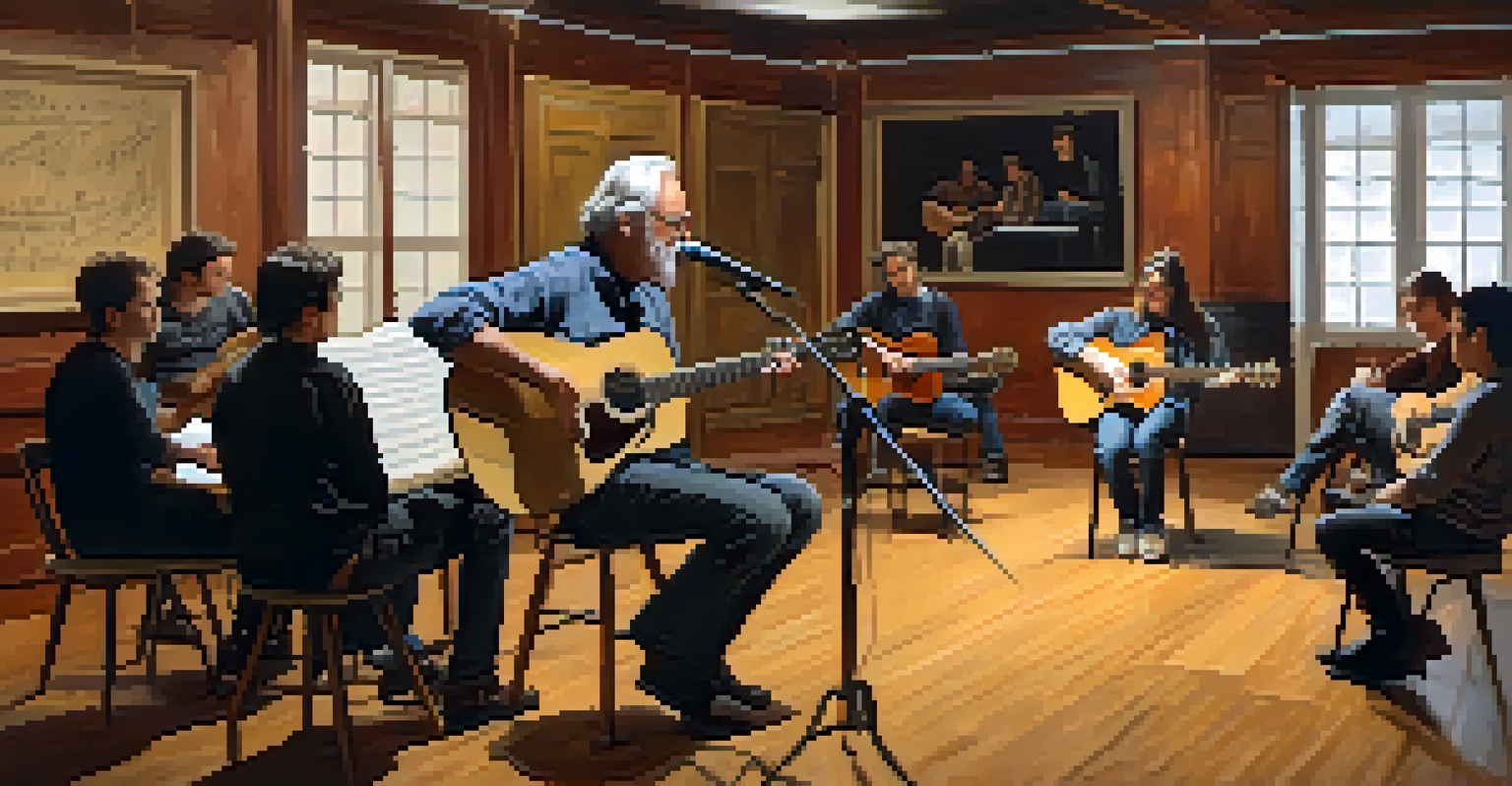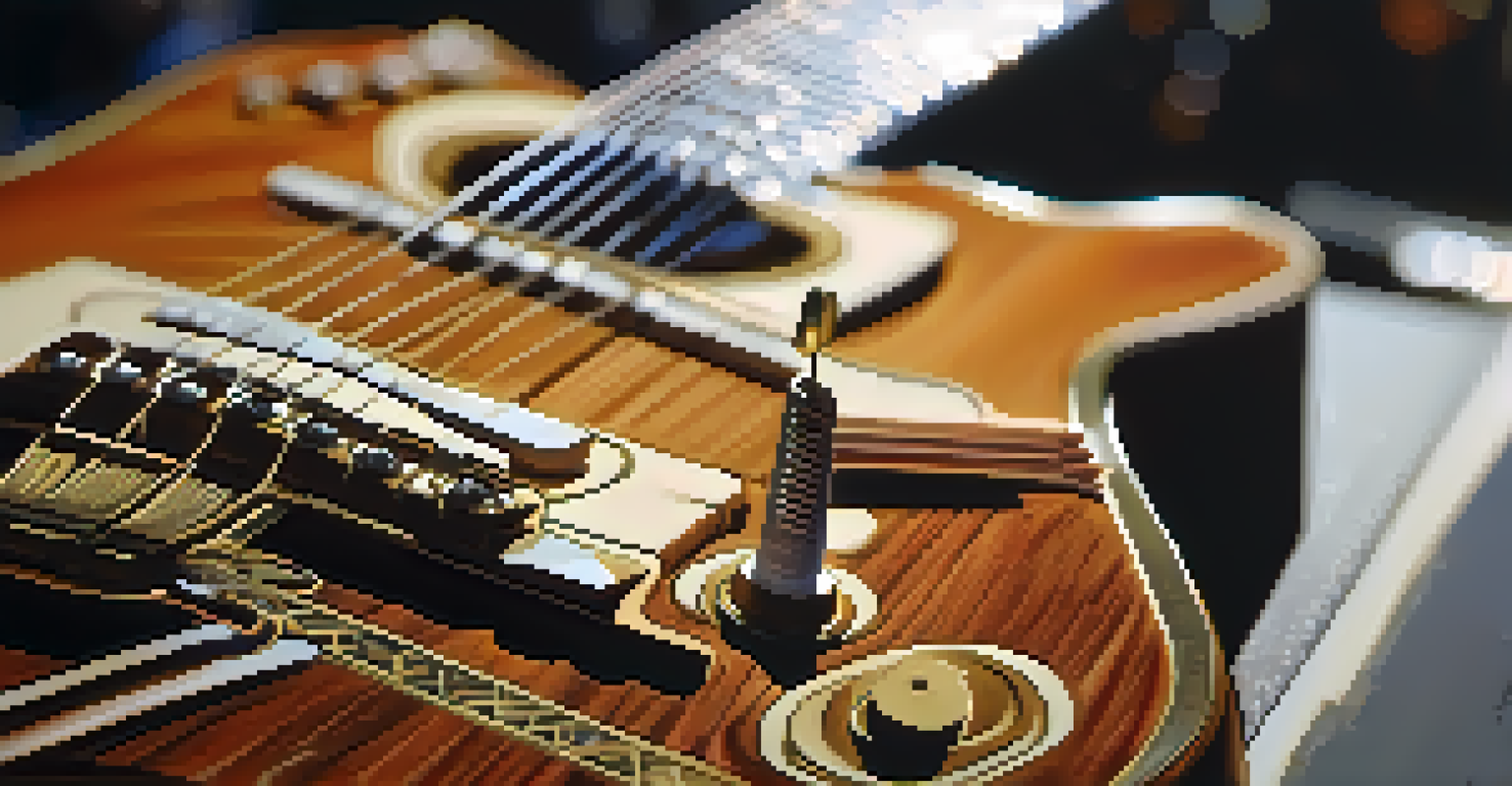The Role of Guitar Competitions in Music Career Advancement

Guitar Competitions: A Launchpad for Musicians
Guitar competitions have become an increasingly popular avenue for aspiring musicians looking to make a name for themselves. These events provide a platform for performers to showcase their skills, creativity, and passion. For many, participating in these competitions can be a pivotal moment, often leading to opportunities that can significantly boost their music career.
Success is where preparation and opportunity meet.
Beyond just the thrill of competition, these events can help musicians sharpen their craft. The experience of preparing for a competition encourages intensive practice and self-discipline, essential attributes for any successful musician. This commitment to improvement not only enhances technical skills but also builds confidence, which is crucial when performing in front of an audience.
Moreover, winning or even just participating in a prestigious competition can open doors to industry connections. Judges and attendees often include influential figures in the music world, such as producers, agents, and fellow musicians. Establishing relationships with these individuals can lead to collaborations, gigs, and other valuable career advancements.
Networking Opportunities at Competitions
One of the most significant benefits of participating in guitar competitions is the networking opportunities they present. Meeting fellow musicians, judges, and industry professionals can create a supportive community that can propel your career forward. These connections can lead to collaborations, mentorships, or even recommendations for gigs and recording opportunities.

Imagine being able to strike up a conversation with a renowned producer or a seasoned artist—these moments often happen in competition settings. Engaging with others who share your passion can lead to invaluable insights and advice, helping you navigate the often-challenging music industry landscape. This camaraderie can also inspire creativity and motivate you to push your boundaries.
Networking Boosts Music Careers
Guitar competitions provide invaluable networking opportunities with industry professionals, fostering relationships that can lead to collaborations and gigs.
Additionally, many competitions host workshops and masterclasses led by experts in the field. These sessions provide participants with direct access to knowledge and skills that can enhance their musicianship. Not only do these experiences enrich your talent, but they also expand your professional network, making competitions a multifaceted opportunity for growth.
Exposure and Visibility Through Competitions
Participating in guitar competitions can significantly increase your visibility as an artist. Many competitions are held in front of large audiences and are often streamed or recorded for wider distribution. This exposure can be invaluable for musicians looking to gain recognition and build a fan base.
Creativity takes courage.
Imagine showcasing your talent on a platform that reaches thousands, if not millions, of viewers. This kind of visibility can lead to an influx of followers on social media and interest from music industry professionals. It's an excellent way to get your name out there, especially if you're just starting your career.
Furthermore, some competitions offer prizes that can include recording contracts, promotional packages, or performance opportunities. These incentives not only reward your hard work but also provide additional channels for exposure that can help establish your career in the music industry.
Skill Development and Musical Growth
Guitar competitions are not just about winning; they are also about personal and musical growth. The process of preparing for a competition encourages musicians to explore new techniques, styles, and genres. This exploration can lead to a more versatile and well-rounded musician, which is vital in today's diverse music landscape.
As competitors strive to perfect their performances, they often receive feedback from judges that can help them identify areas for improvement. Constructive criticism is a valuable tool for growth, enabling musicians to refine their skills and artistry further. Embracing feedback can transform a good musician into a great one.
Visibility Expands Music Reach
Participating in competitions increases visibility for musicians, often resulting in exposure to large audiences and potential industry interest.
Additionally, the pressure of competition can teach valuable lessons in resilience and adaptability. Musicians learn to cope with nerves, manage performance anxiety, and handle unexpected challenges. These are essential skills that serve them well not only in competitions but also in their broader music careers.
Showcasing Originality and Creativity
Guitar competitions provide a unique opportunity for musicians to showcase their originality and creativity. Many competitions encourage participants to perform original compositions, allowing them to express their unique voice and style. This can be a fantastic way to distinguish oneself in a crowded market.
When musicians share their original work, they not only demonstrate their technical abilities but also their artistic vision. This combination can resonate deeply with judges and audiences alike, creating a lasting impression. Standing out through creativity can lead to more performance opportunities and increased interest in your music.
Furthermore, showcasing original material can attract the attention of music industry professionals looking for fresh talent. Whether it's a producer seeking new artists or a venue looking for unique acts, your originality can set you apart and open doors to exciting opportunities.
The Psychological Benefits of Competing
Engaging in guitar competitions can also have a positive impact on a musician's mental health. The thrill of competing and the adrenaline rush of performing can be exhilarating, motivating musicians to push their limits. This excitement can foster a deeper love for music and a renewed commitment to their craft.
Moreover, the experience of performing in front of an audience, even in a competitive setting, can build confidence. As musicians face their fears and overcome challenges, they develop a stronger sense of self-efficacy. This growth in confidence can translate to other areas of their lives, not just their musical pursuits.
Growth Through Feedback and Pressure
Competitions encourage personal and musical growth by challenging musicians to refine their skills through constructive feedback and the pressure of performance.
Additionally, the supportive environment created by fellow competitors can alleviate the stress often associated with performance. Sharing experiences and encouraging one another can foster camaraderie, making competitions a positive experience rather than a solely stressful one. This sense of community can be beneficial for mental well-being.
Post-Competition Opportunities and Career Pathways
The impact of guitar competitions often extends far beyond the event itself. Many musicians find that their participation leads to new opportunities that can shape their careers in exciting ways. From invitations to perform at festivals to securing a record deal, the doors can swing wide open after a successful competition.
For those who place well in competitions, the accolades can enhance their credibility as musicians. Being recognized in a competitive context can serve as a powerful endorsement, making it easier to book gigs and gain the attention of industry professionals. This recognition can be a game-changer in establishing a musician's reputation.

Additionally, some competitions offer ongoing support for their participants, such as mentorship programs or access to resources that can aid in career development. These post-competition opportunities can provide invaluable guidance, helping musicians navigate the complexities of the music industry and maximize their potential.